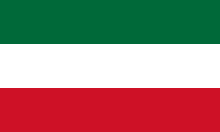2018-05-21
The double significance of this holiday, “Victoria Day” or “Journée nationale des patriotes.”
Sommaire en français Aujourd’hui, c’est à la fois la « Fête de la Reine » et « Journée nationale des patriotes ».
Today is a legal holiday in Canada, both federally and in most provinces and territories. In most places it is called “Victoria Day” or, more colloquially, the queen’s birthday, in honour of the birthday of Queen Victoria. In other words, it is a celebration of the monarchy, that antiquated institution which is ridiculous enough in Great Britain, but even more ridiculous in former colonies such as Canada, because it means that Canada’s head of state is a foreigner!

Patriots’ Flag of Lower Canada,
used from 1832 to 1838.
But here in Quebec, things are done a little differently, fortunately. Here, this late-May holiday is officially named “Journée nationale des patriotes” or “National Patriots’ Day” in honour of the patriots of 1837-1838 who fought for democracy, freedom and national recognition for Lower Canada (now Quebec). Their fight for reform led to a number of armed confrontations with British colonial forces and inspired a similar movement in Upper Canada (now Ontario). Several of those involved ended in exile, while others paid with their lives and were hanged.
Lately we have been inundated with news (i.e. propaganda) about the British royal family, what with the recent marriage of a certain Harry with somebody. This led me to make the following Facebook posting:
Screw the monarchy. I do not give a sweet flying fuck about the goddamn royal wedding. Screw the media for promoting it so stupidly.
…which generated quite a few likes among my friends. One Polish friend observed:
I support your opinion, David. For ages they are parasites identically as a clergy of all religions.
…to which I replied:
Yes, and the monarchy is a religious institution, founded on the principle of “divine right”—the monarch owes his or her title to “the grace of God.” It would be difficult to be more arrogant than that.
Local Montreal media published several good commentaries on this orgy of super-star worship. For example, Antoine Robitaille, in an article published Saturday (May 19th) entitled Pourquoi la monarchie m’énerve (“Why the Monarchy Annoys Me”), observes:
The monarchy and royal families continue to fascinate us. The members of these dynasties are as famous as film stars, perhaps even moreso. This is because we are bewitched by the super-rich. Perhaps even more interesting is the anachronistic aspect which links the present to the nation’s distant past. Nevertheless, the monarchy represents an infantile stage of politics. First and foremost because it is so simple: one person rules, that’s it. This person’s children will take over eventually. Hidden beneath all the glitz and glitter, politics in all its aspects—debate, division, conflict—is obscured. Thus, we tend to be spontaneously monarchist with children. The stories which captivate them often involve kings, princesses and princes.
In another article published the same day, Simon-Pierre Savard-Tremblay considers the cost, both material and symbolic, of this monarchistic nonsense:
All this pomp and pageantry illustrates one thing: that the monarchy as an institution is on life support. Its only remaining option to assure its survival in people’s hearts and minds is to project a cool and fashionable image.[…]
Everyone agrees: royal power today is essentially symbolic and decides absolutely nothing. So be it. But this is an admission that we pay the lifetime salary of governors-general, amounting to close to $300,000 annually, not to mention their 160 employees, including three photographers and four chauffeurs, for no reason whatsoever. […]
But the monetary cost of these positions is not the principal problem. Even if all of them were unpaid volunteers, even if they somehow earned revenue for the state, their positions should nevertheless be abolished. Symbols have meanings. Our head of state is officially Elizabeth II, Queen of Canada. She follows us everywhere, on all our coins. Our members of parliament must swear allegiance to her and must declare that their decisions and actions are guided by an unelected person who holds power, for life, for strictly hereditary reasons […]
All these positions being symbolic, they nevertheless constitute a living reminder that we are still subjects of the queen. […] this backward old institution, which even the most magnificent marriage cannot rescue from irrelevancy, should be consigned to oblivion.
To conclude, two days before the holiday Monday which, in English Canada, is known as Victoria Day, I prefer to wish you an excellent National Patriots’ Day. You remember, right? The patriots who were hung for treason against the British crown? I remember.
Finally, in an article from two years ago, Les patriotes : un devoir de mémoire (“The Patriots: A Duty to Remember”), Joseph Facal offers a brief reminder of the historical context:
The patriots were certainly poorly armed, lacking in experienced military leadership, with no support from the United States, with no clear strategy, and divided between radicals and moderates. However, well-armed, ultraloyalist, paramilitary organizations, tolerated by the British authorities, were determined to kill in the bud any plans for an independent republic of Lower Canada. […]
Was this merely an “ethnic” conflict between French and English? Certainly there were cultural and linguistic animosities. However several anglophones, especially those from an Irish background, were members of the patriot camp and fought against British imperialism. Several francophones, on the other hand, had advantageous social positions and supported the status quo controlled by London.
The patriots fought not only for an independent republic, but also had demands concerning universal suffrage, free education, the death penalty, equality of rights and others. They were inspired by the great principles of the century of Enlightenment and by other emancipation movements on the American continent.
In conclusion, the best way to celebrate this queen’s birthday, 21 May 2018, is to promote abolition of the monarchy and to honour those who fought for freedom and against the monarchy. Joyeuse Fête des Patriotes !